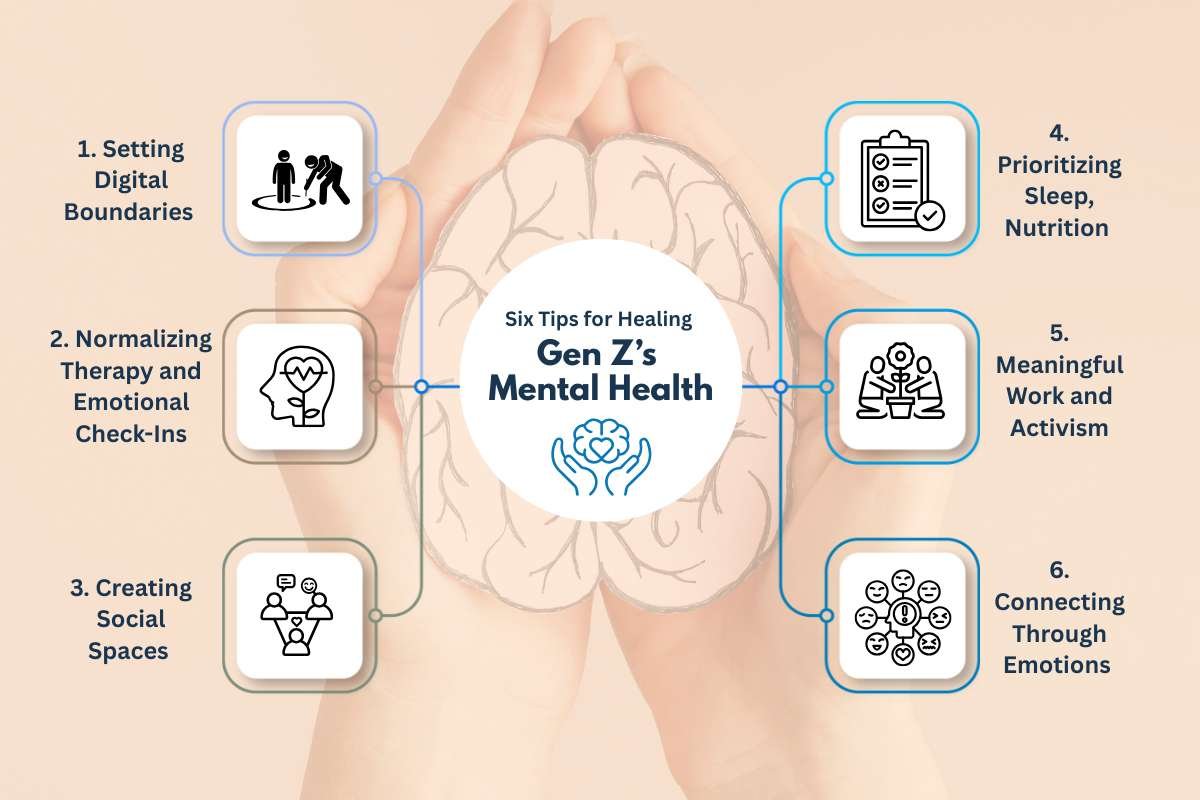Is Gen Z the loneliest generation ever? Generation Z, born between 1997 and 2012, is the most diverse set of people with shared characteristics. Gen Z’s Mental Health is also know as the Most Depressive Generation of this era Yet the most “Cooked Up”. Well, not in the literal sense. Apparently, in their terms, that phrase refers to them as “being tired,” “done with,” or in a situation that might put them in a vulnerable state. The anxieties of the world unite them.
Gen Z witnessed the surge of technology and grew up amidst the chaos. Social media presence is a crucial aspect of their lives; it controls them to an extent. People aged 18-24 have a complex relationship with social media, much like anyone else. It’s the best medium to build connections. Still, from a broader aspect, irrespective of their location, it instills a sense of fear of missing out (FOMO) or being conscious about body image. They feel the need to be vocal about everything.
They might not realize that even simple comforts, like eating while watching YouTube, can signal loneliness. Amidst financial worries and shifting relationships, these traits raise concerns for Gen Z’s mental well-being. Even with vast information and countless things around them, they often live in distress.
Gen Z’s Mental Health Crisis

This generation grew up online, facing unique problems that impact their mental health. The internet gave them endless information and ways to connect, but it also brought cyberbullying, pressure from social media, and too much information all at once. Additionally, these young adults worry about their future, struggle with financial difficulties, and often feel isolated because dating and relationships have undergone significant changes.
From the outside, it might look like they have everything, but underneath, they face the wrath of anxiety, depression, and self-doubt. These are among the underlying reasons that are majorly affecting Gen Z’s mental health.
The world suffered through crises that shaped Gen Z’s perspectives. School shootings, a global pandemic, climate disasters, racial injustice, and economic instability are all ingrained in their formative years. The pandemic, in particular, robbed many budding experiences, leaving behind a trail of emotional detachment and disillusionment.
Even educational and career aspirations have become major stressors. The pressure to succeed in a chaotic job market, rising living costs, and student debt leaves many feeling unprepared and overwhelmed. Considering all these issues, Gen Z’s mental health problems go beyond individual concerns, pointing instead to a broader cultural change.
How the COVID-19 Pandemic Shaped Gen Z’s Mental Health ?

The COVID-19 Pandemic profoundly altered Gen Z. What were supposed to be their essential years, graduations, first jobs, internships, friendships built in college halls, and new independence instead saw bedrooms become classrooms, significant moments diminish into Zoom calls, and isolation take over.
At a time when emotional and social development is crucial, Gen Z was forced into silence and separation. Many young adults lost access to in-person mental health support and experienced family trauma or financial instability. They carried grief, whether for loved ones, lost time, or a sense of certainty. Loneliness, already rising pre-pandemic, turned into full-scale emotional detachment for many.
Online learning was ineffective and emotionally numbing. Motivation depleted. Sleep cycles collapsed. Friendships drifted. For many, anxiety about health, the future, and even simply being around people post-lockdown became normalized.
This generation experienced an identity crisis. The pandemic permanently altered Gen Z’s mental health by deepening an already growing sense of instability.
Six Tips for Healing Gen Z’s Mental Health

1. Setting Digital Boundaries
Gen Z grew up when social media peaked in its dominance. It created a space for them to express themselves, be more vocal about their feelings, and build communities. On a negative aspect, indulging in social media 24/7 can drain personal lives. They don’t have to quit social media; they must manage it wisely.
Setting digital boundaries by turning off notifications, unfollowing toxic accounts, and limiting screen time before bed helps them reclaim space for their minds to breathe. It’s about having control rather than being controlled. This subtle shift can make a significant difference in managing Gen Z’s mental health daily.
2. Normalizing Therapy and Emotional Check-Ins
There’s a growing openness in how Gen Z talks about therapy. Unlike older generations, they’re not afraid to say, “I need help.” Whether online therapy apps or in-person sessions, they’re willing to work towards emotional healing.
It’s not just about professional help. Simple daily actions, like asking a friend how they’re truly doing or writing down feelings in a journal, help young people stay grounded. They’re building a way to talk about emotions that earlier generations didn’t have, and this self-awareness is shaping how Gen Z manages its mental health from within.
3. Creating Social Spaces
During lockdowns, Gen Z turned to virtual connections. Now, they prefer in-person experiences that don’t revolve around productivity. Safe spaces like book clubs, hobby groups, or even mental health cafés offer quiet belonging without pressure to perform.
These interactions can dramatically improve emotional health. A short conversation over coffee, sitting with friends in silence, or making eye contact might seem small, but they counteract many people’s invisible loneliness. Rebuilding the physical community plays a significant role in improving Gen Z’s mental health.
4. Prioritizing Sleep, Nutrition
The hustle mindset doesn’t sit well with this generation anymore. Gen Z knows burnout all too well. Many report feeling emotionally exhausted before even finishing college. They’ve started to resist toxic productivity by embracing rest as a solution for better well-being.
It’s more about recovering rather than sleeping for longer hours. Swapping energy drinks for balanced meals, creating evening wind-down routines, and allowing breaks without guilt are subtle but effective ways to support mental stability. Honoring the body supports Gen Z’s mental health just as much as emotional expression.
5. Meaningful Work and Activism
Gen Z is driven by purpose. Whether climate justice, LGBTQ+ rights, or mental health advocacy, many feel most alive when they contribute to the causes they believe in. This isn’t about saving the world alone; it’s about having a sense of social responsibility.
Volunteering, starting small campaigns, or simply spreading awareness through their social channels gives many Gen Z individuals a sense of empowerment. That sense of meaning becomes a buffer against hopelessness, strengthening Gen Z’s mental health in deeply personal ways.
6. Connecting Through Emotions
This generation doesn’t shy away from emotions. Their feeds often contain crying selfies, funny mental breakdown memes, or raw confessions. It’s dark, yes, but it’s also real. Humor and vulnerability are co-related, and in that mix, healing begins.
They don’t need everything to be fixed; they need spaces where nothing is hidden. Whether it’s group chats, late-night phone calls, or TikToks about anxiety, this expressive culture is helping Gen Z process pain without bottling it up.
Conclusion
Gen Z’s mental health is a generational issue and a cultural reckoning. A chaotic world influences their experiences, but they also work towards emotional well-being. They are exhausted but are determined to heal.
FAQs
Q1. Why is Gen Z struggling more than older generations with mental health?
A. Because they are facing a unique storm of digital overload, social pressure, economic instability, and global crises, often all at once.
Q2. Is Gen Z more open about mental health than millennials or Gen X?
A. Absolutely. They’re pioneering honest conversations and rejecting old stigmas around therapy and emotional struggles.
Q3. What are some warning signs of mental health struggles in Gen Z?
A. Chronic tiredness, withdrawal, high screen time, loss of motivation, and overwhelming anxiety are common signals.
Q4. Can social media be helpful for Gen Z’s mental health?
A. Yes, but only when used mindfully. Following supportive content and avoiding comparison traps can make a difference.
Q5. What kind of therapy do Gen Z prefer?
A. They lean toward personalized, accessible options like online therapy, group healing, or self-guided tools.









